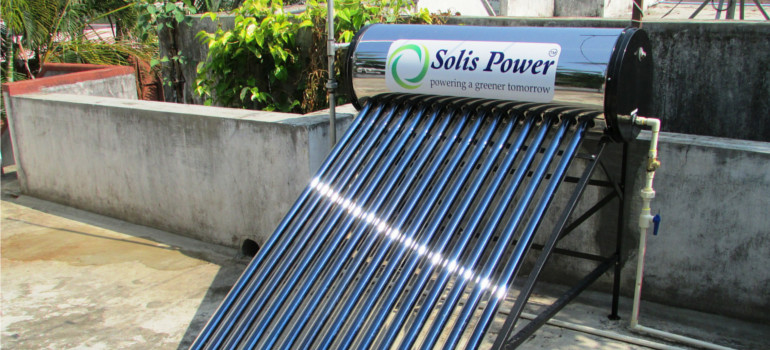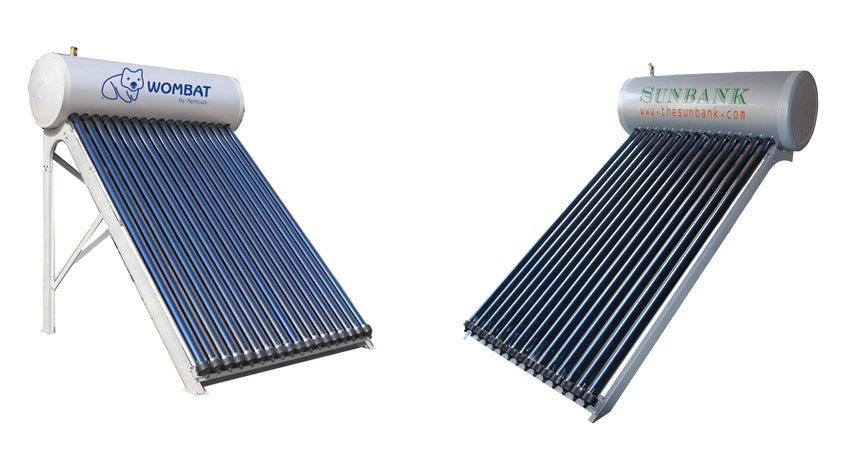Solar hot water heaters are worth it due to their cost savings and environmental benefits. By harnessing the power of the sun, these systems reduce your reliance on traditional energy sources and lower your utility bills, making them a smart investment for both your wallet and the planet.
Additionally, solar hot water heaters require minimal maintenance and have a long lifespan, providing a consistent and reliable source of hot water for years to come. With their proven track record of efficiency and sustainability, there is no denying the value that solar hot water heaters bring to your home.
Economic Benefits Of Solar Hot Water Heaters
When it comes to embracing the advantages of renewable energy sources, solar hot water heaters are increasingly touted as an effective solution. Not only do they reduce your carbon footprint, but they also offer significant economic benefits. In this article, we will explore the various ways in which solar hot water heaters can help you save money in the long run.
Reduction In Energy Bills
One of the primary economic benefits of investing in a solar hot water heater is the substantial reduction in your energy bills. Traditional water heaters rely on fossil fuels or electricity to heat water, which can be expensive. In contrast, solar hot water heaters harness the sun’s energy, which is both free and abundant, to heat your water.
By utilizing solar energy, you can significantly reduce your dependence on conventional energy sources, leading to substantial savings. The more hot water you regularly utilize, the more noticeable the reduction in your energy bills will be. Over time, these savings can add up and make a significant impact on your overall household budget.
Return On Investment (ROI)
Investing in a solar hot water heater also provides a favourable return on investment (ROI). While the initial cost of purchasing and installing a solar hot water heater may be higher compared to traditional water heaters, the long-term savings on energy bills can quickly recover these costs.
With the average lifespan of a solar hot water heater ranging from 15 to 20 years, you can expect to enjoy years of cost savings and energy efficiency. Additionally, the resale value of your property may increase due to the eco-friendly features and potential savings associated with solar hot water heating systems, further enhancing your ROI.
Government Incentives And Tax Credits
As governments worldwide prioritize renewable energy, they often offer incentives and tax credits to promote the adoption of solar technologies, including solar hot water heaters. These financial incentives can significantly offset the initial costs of purchasing and installing a solar hot water heater, making it an even more attractive and economically viable option.
The specific incentives and tax credits available may vary depending on your location. To fully capitalize on these benefits, it is crucial to research and understand the incentives offered in your area. In some cases, these incentives can cover a substantial portion of your initial investment, making solar hot water heaters an even more financially sound decision.
In conclusion, solar hot water heaters offer compelling economic benefits. Through a reduction in energy bills, favourable return on investment, and government incentives and tax credits, these systems provide cost savings while reducing your reliance on non-renewable energy sources. Embracing solar energy not only benefits your wallet but also contributes to a cleaner and more sustainable future.
Environmental Benefits Of Solar Hot Water Heaters
Solar hot water heaters offer many environmental benefits that make them worthy investments for homeowners looking to reduce their carbon footprint and embrace renewable energy sources. From decreased carbon emissions to reduced dependence on fossil fuels, these eco-friendly systems offer a sustainable solution for meeting your hot water needs. Let’s dive deeper into the environmental advantages of solar hot water heaters:
Decreased Carbon Footprint
Solar hot water heaters play a crucial role in minimizing carbon emissions and combatting climate change. By harnessing the power of the sun, these systems generate hot water without relying on traditional energy sources that release harmful greenhouse gases. According to studies, a typical residential solar hot water system can offset approximately 4,000 pounds of carbon dioxide each year – leading to a significant reduction in the overall carbon footprint of your home.
Renewable Energy Source
One of the primary environmental benefits of solar hot water heaters is their reliance on renewable energy. Unlike conventional water heaters that rely on non-renewable fossil fuels like natural gas or coal, solar systems utilize the sun’s energy, which is an abundant and free resource. By harnessing this renewable energy source, solar hot water heaters provide a sustainable alternative that helps protect our planet for future generations.
Reduced Dependence On Fossil Fuels
Solar hot water heaters offer a practical solution to reduce our dependence on fossil fuels. As we continue to deplete these finite resources, finding alternative energy sources becomes imperative. By installing a solar hot water system, you contribute to the shift away from fossil fuels, which not only helps the environment but also strengthens energy independence and reduces our vulnerability to rising fuel prices. With solar hot water heaters, you can make a positive impact while enjoying reliable access to hot water throughout the year.
To summarize, solar hot water heaters provide valuable environmental benefits that make them worth considering for any eco-conscious homeowner. With decreased carbon emissions, reliance on renewable energy, and reduced dependence on fossil fuels, these systems align with a sustainable lifestyle and contribute to a greener future. Embrace the power of the sun and make a difference in both the environment and your energy bills by investing in a solar hot water heater for your home.
Factors To Consider Before Installing Solar Hot Water Heaters
Solar hot water heaters are gaining popularity as a sustainable and cost-effective alternative to traditional water heaters. However, before making the decision to install a solar hot water heater, there are several important factors to consider. By carefully evaluating these factors, you can determine whether a solar hot water heater is worth the investment for your specific needs and circumstances. This article will explore three crucial factors to consider: climate and geographic location, available sunlight, and initial installation costs.
Climate And Geographic Location
The climate and geographic location of your area play a significant role in the effectiveness of a solar hot water heater. Solar panels rely on sunlight to generate energy, so areas with long, sunny days and minimal cloud cover are ideal for maximizing the efficiency of solar hot water heaters. Additionally, the average temperature of your region can impact the heater’s ability to produce hot water consistently. In colder climates, a backup water heating system may be necessary to ensure a constant supply of hot water.
Available Sunlight
Sufficient sunlight is crucial for the successful operation of solar hot water heaters. It is essential to assess the amount of sunlight your property receives throughout the year to determine whether solar panels can generate enough energy to meet your hot water needs. Factors such as shading from trees, nearby buildings, or other obstructions can significantly reduce the amount of sunlight reaching the solar panels. Installing solar hot water heaters in areas with limited sunlight may not be as cost-effective or sustainable.
Initial Installation Costs
The initial installation costs of solar hot water heaters are an important consideration for any homeowner. While solar hot water heaters can save you money in the long run by reducing energy bills, it is necessary to evaluate the upfront costs associated with installation. These costs typically include the price of the solar panels, storage tanks, plumbing, permits, and professional installation fees. However, incentives such as federal or state tax credits, rebates, or grants may help offset some of the initial installation costs, making solar hot water heaters more affordable for homeowners.
By carefully considering the climate and geographic location, available sunlight, and initial installation costs, you can determine whether solar hot water heaters are worth the investment for your home. While they offer numerous benefits, it is essential to evaluate these factors to ensure that solar hot water heaters are the right choice for your specific needs and circumstances.

Credit: www.fantastichandyman.co.uk
Maintenance And Durability Of Solar Hot Water Heaters
Maintenance and Durability of Solar Hot Water Heaters
Solar hot water heaters are a sustainable and cost-effective alternative to traditional water heating systems. Not only do they reduce your carbon footprint, but they can also help you save on energy bills in the long run. However, like any other appliance, solar hot water heaters require regular maintenance to ensure optimum performance and durability.
Routine Maintenance Requirements
Maintenance plays a crucial role in ensuring the smooth operation of solar hot water heaters. While the exact maintenance requirements may vary depending on the type and model of the system you own, here are some routine tasks you should consider:
- Inspecting the solar panels for dirt, debris, or shading that can affect their efficiency
- Cleaning the panels periodically to remove any accumulated dust or grime
- Checking the plumbing connections for leaks or cracks
- Inspecting the temperature and pressure relief valves
- Checking the fluid levels and topping up if necessary
Lifespan Of Solar Panels
The lifespan of solar panels, which are the backbone of solar hot water heaters, is a significant aspect to consider when evaluating their durability. High-quality solar panels are designed to last for several decades, typically around 20 to 30 years.
Various factors can influence the lifespan of solar panels, including:
- Quality: Investing in well-built solar panels from reputable manufacturers ensures longevity.
- Maintenance: Regular cleaning and maintenance help extend the lifespan of solar panels.
- Climate: Extreme weather conditions can have a long-term impact on the durability of solar panels.
Warranty Coverage And Support
When purchasing a solar hot water heater, it is crucial to consider the warranty coverage and support provided by the manufacturer. A comprehensive warranty not only protects your investment but also indicates the manufacturer’s confidence in the product’s durability.
The warranty for solar hot water heaters typically covers the panels, storage tanks, and other components for a specified period. It is essential to review the warranty terms and conditions, including any exclusions or limitations.
Additionally, manufacturers who offer strong customer support and readily available technical assistance can be a valuable asset in case any issues arise with your solar hot water heater.
Comparison With Conventional Water Heaters
When it comes to choosing the right water heating system for your home, it’s essential to consider the advantages and disadvantages of each option. In this section, we will compare solar hot water heaters with conventional water heaters, focusing on three key factors: energy efficiency, long-term savings potential, and performance and reliability.
Energy Efficiency
The energy efficiency of a water heater is an important aspect to consider, as it directly impacts your energy consumption and utility bills. Solar hot water heaters have a clear advantage in terms of energy efficiency. These systems harness the power of the sun to heat your water, utilizing renewable energy and reducing your reliance on electricity or gas. This can significantly lower your carbon footprint and contribute to a greener future.
Conventional water heaters, on the other hand, are typically powered by electricity or gas, which means they consume more energy to heat the water. This can translate into higher energy bills over time. Additionally, conventional heaters often experience heat loss during the storage and distribution process, further reducing their overall efficiency.
Long-term Savings Potential
When it comes to long-term savings, solar hot water heaters offer considerable advantages. While the upfront costs of installing a solar system may be higher compared to conventional heaters, the savings over time can outweigh this initial investment.
Solar hot water heaters can provide substantial savings on your energy bills, especially in regions with ample sunlight. As you generate your own hot water using solar power, you rely less on the traditional energy grid and can potentially eliminate or significantly reduce your monthly heating expenses.
Furthermore, many governments and utilities offer financial incentives, such as tax credits or rebates, for installing solar water heaters. These incentives can further offset the initial costs and increase your long-term savings potential.
Performance And Reliability
When it comes to performance and reliability, solar hot water heaters are highly regarded. These systems are designed to withstand various weather conditions and can effectively heat water even on cloudy days. With proper maintenance, solar hot water heaters can provide a consistent and reliable supply of hot water for many years.
Conventional water heaters have a track record of reliability as well, but they may require more frequent maintenance and replacement compared to solar systems. Additionally, conventional heaters are prone to fluctuations in performance and may experience issues like inadequate hot water supply or water temperature inconsistencies.
In conclusion, solar hot water heaters offer significant benefits when compared to conventional water heaters. They are more energy-efficient, have the potential for long-term savings, and provide reliable performance. By harnessing the power of the sun, solar hot water heaters not only save you money but also contribute to a more sustainable future. Consider investing in a solar hot water heater for your home and enjoy the many advantages it brings.
Frequently Asked Questions
Are Solar Hot Water Heaters Cost-effective?
Yes, solar hot water heaters are cost-effective in the long run. Although the initial installation cost may be higher, they can significantly reduce your monthly energy bills and provide a return on investment within a few years. Additionally, some regions offer tax incentives and rebates for installing solar hot water heaters, further increasing their cost-effectiveness.
How Do Solar Hot Water Heaters Work?
Solar hot water heaters use the sun’s energy to heat water. They consist of solar collectors, a storage tank, and a circulation system. The solar collectors absorb sunlight and transfer the heat to the water in the storage tank. The circulation system then delivers the heated water to the faucets and showers in your home.
It’s a sustainable and environmentally friendly way to heat water.
Can Solar Hot Water Heaters Work In Cloudy Climates?
Yes, solar hot water heaters can still work efficiently in cloudy climates. While they perform best in direct sunlight, they can still generate heat on overcast days. The solar collectors can absorb diffused sunlight and convert it into heat. Even when the weather is not ideal, solar hot water heaters can save energy and reduce your reliance on traditional water heating methods.
How Long Do Solar Hot Water Heaters Last?
On average, solar hot water heaters have a lifespan of 20 to 30 years. Proper maintenance and regular inspections can extend their longevity. Components such as the storage tank and circulation system may require occasional maintenance or replacement. However, overall, solar hot water heaters are durable and provide a sustainable solution for heating water.
Conclusion
Solar hot water heaters offer numerous benefits, such as reduced energy costs, lower carbon footprint, and reliable performance. With their ability to harness the power of the sun, they provide an environmentally friendly and sustainable solution for heating water. Additionally, the long-term savings and potential incentives make them a worthwhile investment for homeowners.
So, if you’re looking to save money and contribute to a greener future, solar hot water heaters are definitely worth considering.

